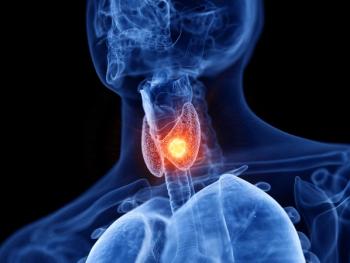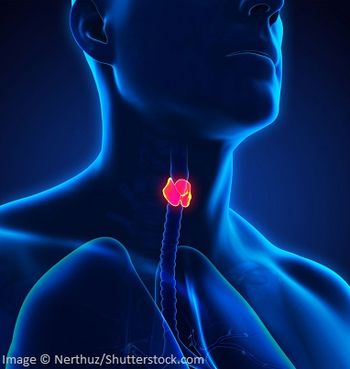
Can Vitamin D Serve as a Potential Biomarker for Thyroid Cancer?
Vitamin D deficiency may be a negative prognostic indicator for papillary thyroid cancer, according to the results of a recent retrospective study.
Vitamin D deficiency may be a negative prognostic indicator for papillary thyroid cancer, according to the results of a retrospective study
“At this point, it remains unclear if vitamin D status does indeed play a significant role in prognosis of thyroid cancer. In our institution, we routinely screen patients planning to undergo thyroidectomy preoperatively for hypercalcemia and vitamin D deficiency,” said
“This is done in part to identify co-existing primary hyperparathyroidism cases as well as to decrease chances of postoperative hypocalcemia by correcting vitamin D deficiency preoperatively,” explained Manroa.
In the current study, Sulibhavi et al examined the medical records of all patients who were administered thyroidectomy between 2000 and 2015 at a single institution. They excluded patients with non-papillary thyroid cancer pathology, prior malignancy, and no record of vitamin D levels. In total, they mined 334 patient records for cancer stage, vitamin D levels, vitamin D deficiency history, and demographic and comorbidities. Thyroid cancer stage was categorized into early stage (Stage I and II) or late stage (Stage III and IV) per the American Joint Committee on Cancer 6th and 7th editions.
Patients with a documented history of vitamin D deficiency were more likely to have advanced disease compared with patients without documentation of vitamin D deficiency (28.6% vs 14.7%; P = .028). But vitamin D laboratory values were not correlated with cancer stage (P = .871). This discrepancy between the verisimilitude of documentation findings and the equivocal findings of laboratory values could mean that documentation may have demonstrated enhanced accuracy vs that of laboratory values in demonstrating actual vitamin D status.
The association between vitamin D deficiency and cancer stage stayed significant after multivariate analysis (P = .011) accounting for gender, age, and body mass index (BMI).
Patients with documented vitamin D deficiency exhibited lower 25-hydroxyvitamin D nadirs (21.5 ng/mL vs 26.5 ng/mL; P = .008). They were also more than twice as likely to take vitamin D supplementation at time of surgery (92.6% vs 41.8%; P < .001).
Race and ethnicity were not identified as potential confounders during univariate regression, and were not significantly associated with cancer stage (P = .741 and P = 1.000, respectively). Furthermore, neither the median income of subjects nor the season in which the vitamin D levels were drawn was associated with lung cancer stage and were not included in multivariate regression.
“Vitamin D is an important potential prognostic factor because it is easily modifiable, and many of the previously identified risk factors such as age, sex, and tumor size are not modifiable,” wrote the authors. “Vitamin D can be given therapeutically to patients with thyroid malignancies.”
A number of preclinical studies have shown growth arrest of thyroid cancer following administration of certain 1,25-dihydroxyvitamin D [1,25(OH)D] analogs via the inhibition of tumor proliferation. These results demonstrate the impact that vitamin D status may exert thyroid cancer progression.
Manroa compared the current findings with those of other similar studies. “Low levels of vitamin D have been associated with Hashimoto's thyroiditis and Graves' diseas. The findings of this study are similar to others where vitamin D deficiency as identified by laboratory values did not show any significant correlation with clinical, pathological, or recurrence data in patients with papillary thyroid carcinoma.”
Newsletter
Stay up to date on recent advances in the multidisciplinary approach to cancer.





































